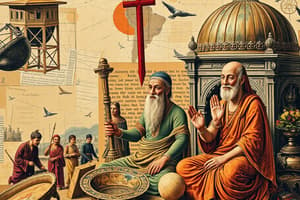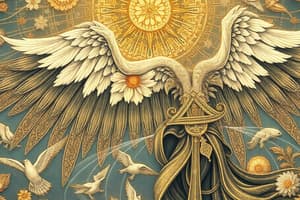Podcast
Questions and Answers
What term refers to the Buddhist concept of suffering or dissatisfaction?
What term refers to the Buddhist concept of suffering or dissatisfaction?
Which festival is known as the festival of lights in Hinduism?
Which festival is known as the festival of lights in Hinduism?
Which of the following is a key principle in Jainism promoting non-violence?
Which of the following is a key principle in Jainism promoting non-violence?
What is the sacred scripture of Islam called?
What is the sacred scripture of Islam called?
Signup and view all the answers
What is the term for the communal prayers observed every Friday in Islam?
What is the term for the communal prayers observed every Friday in Islam?
Signup and view all the answers
Signup and view all the answers
Study Notes
Abrahamic Religions
- Abraham is a crucial figure in Judaism, Christianity, and Islam, considered a patriarch.
- Islam worships Allah, the one God.
- Judaism and Christianity have a set of commandments guiding their followers.
- Covenants are agreements between God and individuals or groups in these faiths.
- Creeds are statements of faith summarizing core beliefs.
Non-Abrahamic Religions
- Hinduism is polytheistic, encompassing various deities like Shiva.
- Buddhism focuses on concepts like Anatta (no self), Anicca (impermanence), and Dukkha (suffering).
- The Four Sights were pivotal experiences for Siddhartha Gautama (Buddha).
- The Middle Path is a Buddhist teaching about moderation.
- Sikhism follows the Five Ks, and practices include the Khanda.
- Hinduism incorporates the concept of reincarnation and Moksha (liberation).
- Dharma in Hinduism and Buddhism represents duty.
- The concept of Atman (soul) is central to Hinduism, and Brahman is a universal consciousness.
- Buddhism emphasizes the Wheel of Life and enlightenment.
- The Vedas are sacred scriptures in Hinduism.
Other Religious Concepts
- Ahimsa is the principle of non-violence.
- Alpha and Omega signifies God's omnipresence in Christianity.
- Islamophobia is the fear or hatred of Islam.
- Caste System is a class-based social structure found in some parts of India.
- Circumcision is a religious practice in some traditions.
- Diwali is a major Hindu festival.
- Guru is a spiritual teacher in Hinduism and Sikhism.
- Holi is a spring festival celebrated in India.
- Islam is a monotheistic religion centered around the Quran.
- Jihad can refer to spiritual struggle or physical conflict.
- Karma refers to the consequences of actions in many faiths.
- Kashrut/kosher relates to dietary laws in Judaism.
- Lotus is a symbol with religious significance in Hinduism and Buddhism.
- Mecca is a sacred city for Muslims.
- Medina is another important city in Islam.
- Menorah is a Jewish candelabra.
- Puja is a Hindu act of worship.
- Reincarnation is the belief of rebirth after death.
- Rosh Hashanah is a Jewish new year festival.
- Sabbath is a day of rest observed in Judaism.
- Salat is the Muslim prayer.
- Shema is a Jewish prayer.
- Synagogue is a Jewish house of worship.
- Talmud is a collection of Jewish teachings.
- Torah/Tanakh is the foundational text of Judaism.
- Varanasi is a sacred city in Hinduism.
- Wudu is a Muslim purification ritual.
- Yom Kippur is a Jewish day of atonement.
- Zakat is a form of charity in Islam.
- Burka is a type of clothing in some Islamic cultures.
- Paths to salvation are ways individuals achieve their ultimate goals, spiritual liberation, in various religious traditions.
- Constantine was a Roman emperor who played a role in Christianity's development.
- Council of Nicaea was a council that defined Christian doctrine.
- Cosmocentric view focuses on the universe or cosmos as the primary reference point.
- Dukkah is a Buddhist concept relating to suffering.
- Easter is a Christian festival.
- Five Ks are articles of faith important to Sikhism.
- Ganges is a sacred river in Hinduism.
- Great Schism refers to the division of Eastern and Western Christianity.
- Indigenous refers to the original inhabitants of a specific area or region.
- Khanda is a symbol of Sikhism.
- Minaret is a tower found in mosques.
- Pentecost is a Christian festival.
- Polytheistic beliefs involve worship of multiple deities.
- Protestant Reformation was a major movement within Christianity.
- Anti-Semitism is prejudice or discrimination against Jewish people.
- Agnostic refers to the belief that the existence of God is unknown.
- Atheist is someone who does not believe in God.
- Aum is a sacred sound in Hinduism.
- Avatar is an embodiment of a god or goddess in Hinduism.
- Bar/bat Mitzvah is a Jewish ceremony marking a young person becoming religiously mature.
- Four sights refers to the Four sights which Buddhist monks saw when they went into the world.
- Moksha is a state of liberation in Hinduism.
- Monism is the belief that all is one.
Studying That Suits You
Use AI to generate personalized quizzes and flashcards to suit your learning preferences.
Description
Explore the key concepts and figures of both Abrahamic and Non-Abrahamic religions. This quiz covers fundamental beliefs, practices, and historical contexts of Judaism, Christianity, Islam, Hinduism, Buddhism, and Sikhism. Test your understanding of their similarities and differences!




